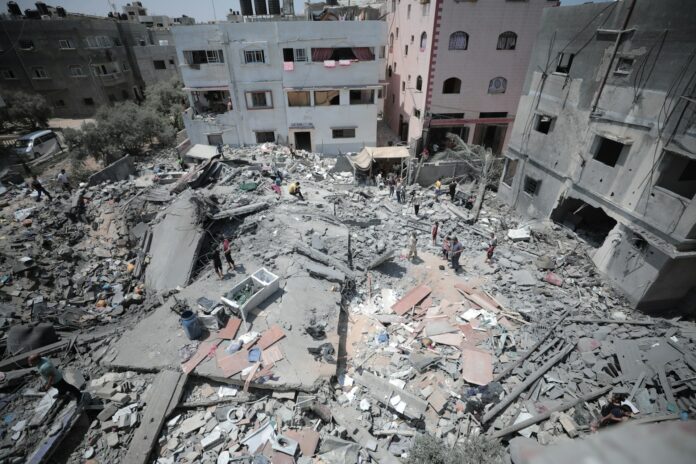Israeli military intensifies operations in Rafah, Gaza, resulting in widespread casualties and humanitarian crisis amid ongoing conflict with Hamas
In a dramatic escalation of hostilities, Israeli forces unleashed a barrage of airstrikes and ground assaults on Rafah, a city in southern Gaza, leading to the deaths of at least 45 Palestinians. The assault, which began with targeted strikes aimed at Hamas positions and infrastructure, quickly expanded to encompass broader areas of the city. Tanks rolled into Rafah from multiple directions, supported by airstrikes from aircraft and naval vessels offshore.
Residents of Rafah, already beleaguered by months of conflict, described scenes of chaos and devastation as explosions rocked neighbourhoods and gunfire echoed through the streets. The assault focused on strategic areas where Hamas militants were believed to be entrenched, including Mawasi in the western part of the city. Reports from Palestinian health officials indicated significant civilian casualties, with families sheltering in makeshift tents bearing the brunt of the attacks.
The Israeli military asserted that its actions were based on precise intelligence targeting Hamas operatives and underground tunnels used for military purposes. They claimed the strikes were necessary to neutralize threats posed by Hamas and to protect Israeli civilians from ongoing rocket attacks originating from Gaza.
As the assault intensified, humanitarian concerns grew exponentially. Medical facilities in Rafah struggled to cope with the influx of casualties, exacerbated by the destruction of infrastructure vital for providing basic services. The United Nations and international humanitarian organizations condemned the escalating violence, calling for an immediate cessation of hostilities to prevent further loss of life and alleviate the suffering of civilians.
Analysis:
Political: The assault on Rafah underscores the complex geopolitical dynamics of the Israeli-Palestinian conflict. It highlights Israel’s security imperatives and its military strategy aimed at weakening Hamas, which is designated as a terrorist organization by Israel and other countries. The international community’s response varies, with some nations supporting Israel’s right to defend itself while others criticize the disproportionate use of force and its impact on civilian populations.
Social: The conflict in Rafah exacerbates existing social divisions within Palestinian society, deepening grievances and fueling resentment against Israeli military actions. It also underscores broader societal debates on the ethics of warfare, particularly concerning civilian casualties and humanitarian protections in conflict zones. The assault prompts global protests and advocacy efforts for peace and justice in the region.
Racial: In the context of the Israeli-Palestinian conflict, the assault on Rafah raises issues of racial discrimination and inequality, particularly regarding the treatment of Palestinians living under Israeli occupation. It amplifies discussions on racial justice and human rights violations within the framework of international law and humanitarian norms.
Gender: Women and children are disproportionately affected by the violence in Rafah, facing heightened risks of injury, displacement, and trauma. The assault exacerbates gender-based vulnerabilities within Palestinian communities, highlighting the urgent need for targeted humanitarian assistance and protection measures.
Economic: The ongoing conflict in Rafah further devastates Gaza’s already fragile economy, compounding the humanitarian crisis and hindering prospects for long-term development. It disrupts essential services and infrastructure, exacerbating poverty and unemployment among the civilian population. The economic impact underscores the urgent need for international assistance and reconstruction efforts to rebuild Gaza’s shattered communities
